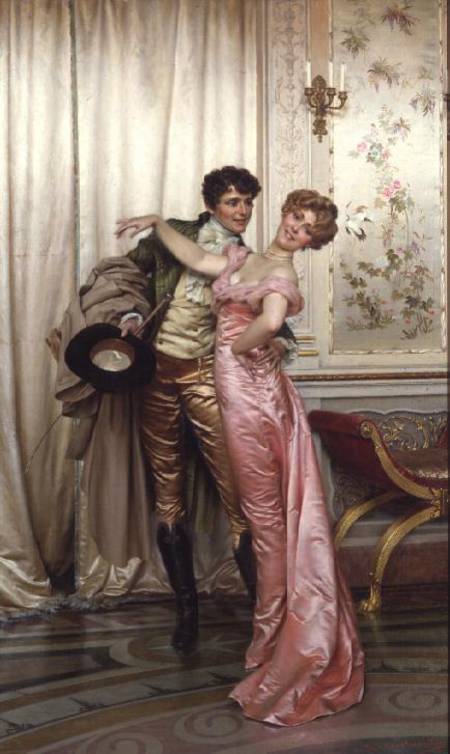What’s wrong with a little romance?

© Guildhall Art Gallery, Corporation of London, UK
French, out of copyright
So what’s wrong with a little romance? According to a regency era perspective, nearly everything.
It’s Valentine’s Day and there’s romance in the air. What’s wrong with a little romance, right? Especially in the pages of a good book. A regency romance; the hero and heroine looking longingly into each other’s eye, declaring their deepest love for one another. She weeps as she lets him know how she was waiting for this moment, as everyone she knew counseled her she should marry only for deepest love.
Woah, wait, stop the presses! As the commercial said, that’s not how this works. That not how any of this works. What, no, you can’t possibly mean that. Of course, passionate, romantic love is the precursor to an offer of marriage.
Maybe today it is, but in the regency era, no so much. In fact, it was rather counseled against. First came friendship, then came marriage, then, hopefully love would follow.
No, please, say it isn’t so. Well, uhm, yeah, it is. Bear with me as we go back a couple hundred years and take a look at this.
Until around 1780, arranged marriages were de rigueur. Marriage—at least among the upper classes and moneyed individuals—was a business and often political arrangement. It worked out well enough and everyone pretty well understood the rules. (And of course it led to a great number of courtly affairs and intrigues which are great romance plot fodder—wait, I digress. Back to the point…)
Things were well enough, but then the Enlightenment happened and philosophers made a mess of things they hadn’t really been invited to muck around with. Their pesky notions of reason and individualism over tradition got people thinking that perhaps personal preference should play a role in marriage. That led to considering love and – ack! – romance as possible players in the field and that lead to something near panic for parents and anyone else who cared about social order and stability.
(I rather hate to admit it, but anyone who has had kids, and worse, watched them marry off, understands the panic all too well. So what’s a good parent to do?)
Buy a book. Definitely buy a book.

Conduct literature appeared on the scene to rescue humanity from itself. (And probably to fill a market niche, but that’s another issue altogether.) Authors readily offered advice on how to judge character, how to behave in public toward the opposite sex, how to attract the opposite sex, even the proper way to make or refuse an offer of marriage. What relief! Someone knows what to do!
Young people were advised to pursue friendship and domestic compatibility.
Corbould (1834) wrote:
Most women are inclined to romance. This tendency is not confined to the young or to the beautiful; to the intellectual, or to the refined.— Every woman capable of strong feeling is susceptible of romance; and though its degree may depend on external circumstances, or education, or station, or excitement, it generally exists, and requires only a stimulus for its development…. Romance is, indeed, the charm of female character. … (but) It is associated in the minds of many with folly alone.
Gregory (1774) recommended: ONE of the chief beauties in a female character is that modest reserve, that retiring delicacy, which avoids the public eye, and is disconcerted even at the gaze of admiration.
Young men were advised:
Those marriages generally abound most with love and constancy, that are preceded by long courtship. The passion should strike root, and gather strength before marriage be grafted on it. A long course of hopes and expectations fixes the idea in our minds, and habituates us to a fondness of the person beloved… (The Young Husband’s Book 1839.)
Out of this advice, strict rules for behavior during courtship developed. The rules safeguarded both sexes, largely by squelching opportunities for romance to develop. After all, gentlemen required protection from being trapped into matrimony and ladies needed to be guarded from becoming attached to men who were not honest in their intentions toward them.
Young men were counseled not to embark upon courtship lightly, and young women not to give affections too easily.
I cannot even understand how it is flattering to a man’s vanity, to gain the affections of a deserving and too credulous woman, whom he never intends to marry. He ought to lose more in his character for integrity, than he can gain as one successful in courtship. His manner of address, consisting of a visible attachment. While his heart is not engaged, is most detestable hypocrisy. And to say that he is not bound in honour, because he has subjected himself to no specific promise, is the highest aggravation of his guilt. Were he to act in the same manner in his common transactions with mankind, his character would be forever blasted….A woman is often placed in a very delicate situation. She may be distinguished by a kind of attention which is calculated to gain her affections, while it is impossible to know whether the addresses of her pretended lover will end in a serious declaration. (Gener, 1812)
Consequently, female conduct manuals universally cautioned women not to be forward in their dealings with men or to encourage their advances. A woman must never confess her feelings until absolutely convinced of his intentions. Some went so far as to insist a woman must never look at a man unless he made the first advance.
Other rules to help squash the possibilities of romantic passion included forbidding the use of Christian names, paying compliments, driving in carriages alone together, and any written correspondence. Naturally, all forms of touching were kept to a minimum. Sakes alive, what kind of unrestrained behavior might that lead to?
Putting a lady’s shawl about her shoulders, or assisting her to mount a horse, enter a carriage or climb stairs were acceptable. A gentleman might take a lady’s arm through his to support her while out walking. But he must never try to take her hand, even to shake it friendly-like. If he did, she must immediately withdraw it with a strong air of disapproval, whether she felt it or not. Conversations had to be extremely discreet leaving much to be interpreted from facial expressions alone. Even those were proscribed by many advice writers.
There is another Character not quite so criminal, yet not less ridiculous; which is, that of a good humour’d Woman, one who thinketh me must always be in a Laugh, or a broad Smile, because Good-Humour is an obliging Quality… . (The Whole Duty of a Woman, 1737)
Laughable though these restrictions are, there were some genuinely good reasons for them. While philosophy did alter some perspectives about marriage, some things did not change. At the core, marriage was still a business arrangement, men and women each bringing their part to the matter.
Real property, dowries and fortunes, trades, skills (including those of keeping house), social connections (of course those might be good or bad, just saying…) and the provision of heirs were all very real commodities in the transaction. One needed to make sure that arrangements offered equitable compensation as it were, for all involved and no one, including the extended families, was being shorted in the exchange.
If this weren’t enough reason for anxiety, add to it that divorce was nearly impossible to obtain. It was entirely possible that one might have only one opportunity to ‘get it right’ as it were. Granted, widowhood was common enough, and some married multiple times because of it, but it probably wasn’t a good thing to count on second chances.
No wonder parents and guardians were in actively deterring their offspring from romance. With so much on the line, can you really blame them for supporting rules designed to keep runaway passions at bay and encourage level-headed decision making?
Find References Here!
To Read more articles on weddings, click here.
To read more articles on courtship, click here.
To read more articles on marriage, click here.
If you enjoyed this post, you might enjoy this book:

How on earth did they communicate using facial expressions if the woman was advised to keep her eyes cast down? 🙂
I suppose there is the argument for both sides. As the person getting married you would want to choose your own partner but as the parent you would possibly have other thoughts on the matter?
As long as these were of character and not of a financial nature that could be ok I suppose.
Intriguing article, thank you Maria.
It really does put a different spin on this, doesn’t it? I also have to wonder just how many actually followed the advice as they should?
As the mother of a recently engaged son, I totally get the parents’ point of view!
Thanks for such an extremely interesting post. Makes one wonder how anything ever got arranged at times.
I feel your pain, first son got married three years ago–oh the angst! And I love my daughter-in-law! Still got two more to go…
While reading the Genet quote, I couldn’t help but think of Bingley!
Thanks for this interesting post.
LOL! I had the same thought!
I too thought of Jane and how Darcy could not tell if she was receptive to Bingley’s attention. She may have taken to heart the advice not to show her interest. Poor Jane. Wow! Indeed, how did they ever get together? I love this post. Thanks for sharing.
It really does make one wonder, doesn’t it?
Maria,
Thank you for a delightful post. I often feel my face is too expressive. On my mind—on my face. As lovely as the Regency era was, I am thankful I missed it. I would have been in such trouble!
I’ve had similar thoughts. Nice place to visit, wouldn’t want to live there!